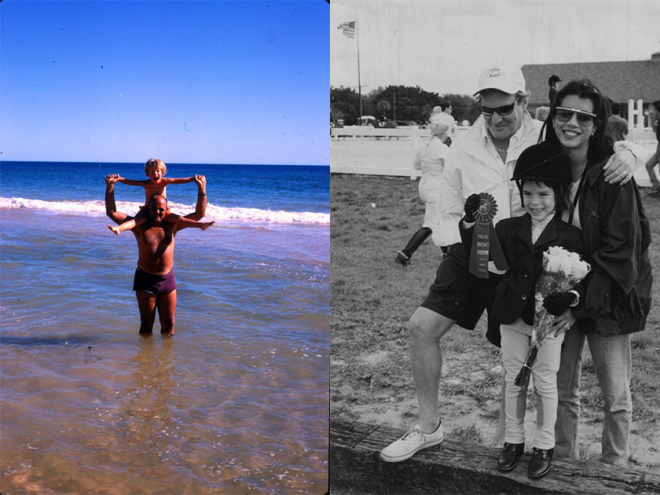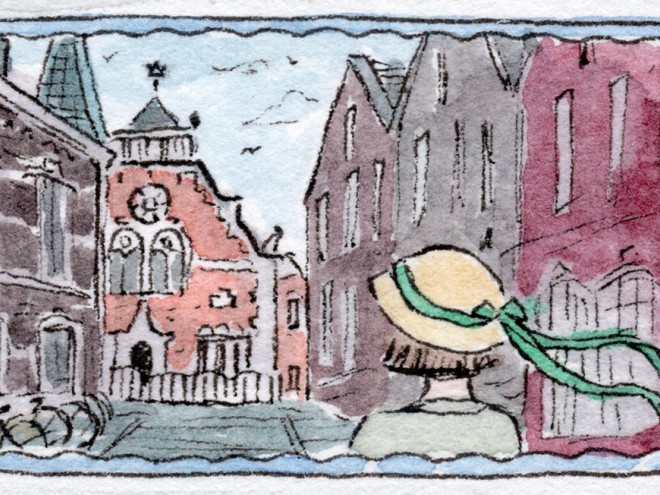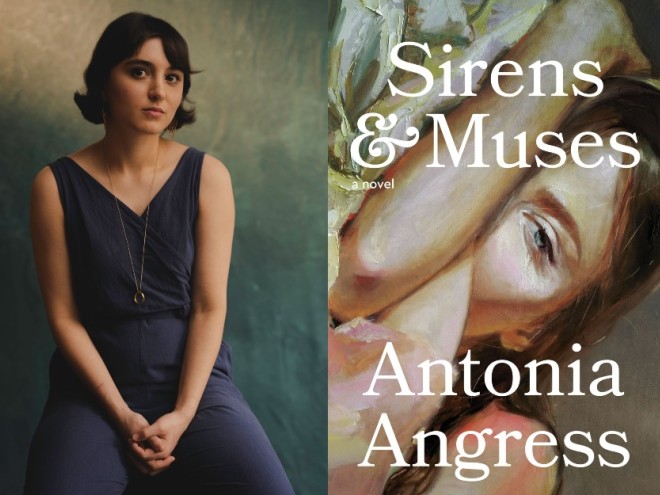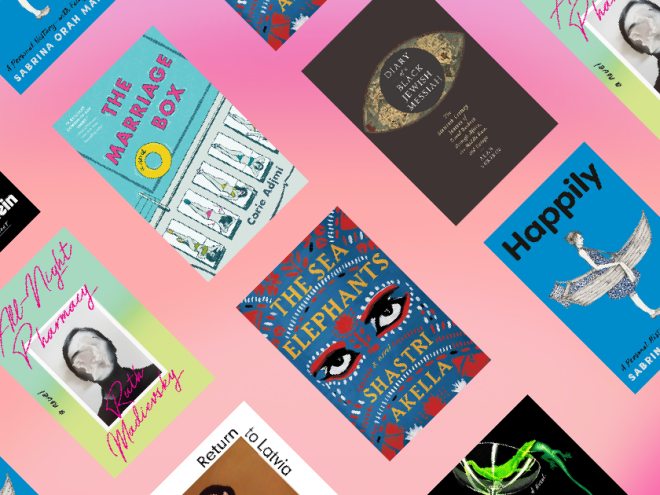Jewish Book Council sat down with artist Gena Feith to talk about the inspiration behind her Jewish Book Month poster, the connection between writing and art, and illustrating her best friend’s challah recipe.
 Becca Kantor: Tell me about your inspiration for the Jewish Book Month poster. What drew you to this project?
Becca Kantor: Tell me about your inspiration for the Jewish Book Month poster. What drew you to this project?
Gena Feith: Books and writing and painting are my passions, so this project combined a lot of the things in my wheelhouse. It seemed like a great fit. When I talked to Naomi [the Executive Director of Jewish Book Council] about what the vision was, I understood the essence of what they were trying to communicate — that what the Jewish Book Council has done for ninety years is not just the promotion of Jewish books, but it’s also fostering community and connection through books. The idea was to depict community through reading. I pitched them a bunch of different ideas, and it’s funny, this is the one I threw on at the end. It was actually a photograph of three blind children reading. That’s why the books are so big. But I kept the books really big because I liked that their presence is sort of like another character in the painting.
BTK: What does the composition of the painting symbolize to you?
GF: Sometimes you don’t even know what you’re painting until you’re painting it, and then you find meaning in it. I like the fact that the children are all involved in their own books, and the girl in the center is daydreaming. Even when I’m very absorbed in a book I have the tendency to drift off and think about how it relates to my life, or life in general. I like how the painting ended up evoking the dreamy quality of entering into these other worlds, and the work you can get done while dreaming.
Reading is such an intimate thing — it’s just you and this book — but some of my greatest friendships have been forged through reading together. Life doesn’t always allow for solitary, uninterrupted quiet time, especially when you have kids, when you have work, when you have this and that. But it can be such an important getaway into another reality.
BTK: In addition to being an accomplished artist, you also earned an MFA in creative writing and worked as speechwriter for several years. How does your background in writing influence your visual art?
GF: I got my MFA in creative nonfiction at Columbia. When I was getting my MFA I had a tendency to write with a painterly quality. I collected words sort of like they were dabs of paint on my palette. I do appreciate a good story, but what was tricky was that I would get so consumed by the wordy painting of these worlds that it was like: what really happened in the story? I’m not really sure!
When my daughter was born, I started painting again because it was sort of a way of writing; it was a way of making stuff and telling stories. I found a lot of joy in it. And it made sense — I used to write how I painted, a little bit, and I hope that I paint a little bit like how I write. Just the digressions, and the things that catch my eye, and the things I think are beautiful.
BTK: You’ve also combined writing and art in previous projects, like your graphic novel The Illustrated Eulogy of Herman Katz: Spaniel, Lover, Snackoholic. Do you feel that illustrations or art can be an integral part of books? Were you influenced by illustrations when you read as a child?
GF: Totally, completely. And I do miss that in books. The illustrations in Alice in Wonderland are like nothing else. I wish that there were more of that. Even now with my daughter we read the same books over and over and over again. That gets a little tedious, but I enjoy going back to these books so much. I’ve always loved writing and painting, but some of my favorite painters and writers, even my favorite adult painters and writers, are sort of like visual storytellers.
BTK: Is Judaism important thematically in your art?
GF: Probably the most resonate ways that my Jewish identity comes through in my work is through my focus on family and memory. I work mostly from photographs and I paint a lot of paintings of old pictures of my family and new pictures of friends and mementos and keepsakes. I did a whole series of pillowcases that my mother needlepointed in the 1970s while waiting in cars for my father (who is notoriously unpunctual). And they’re such treasures to me — to me they tell such a story. It’s funny how these things that you paint can become a little bit of the person but they also become a little bit of you.
 Right now I’m illustrating my best friend’s challah recipe. She taught me how to make challah maybe six months ago, and it’s become a mindfulness practice for me. I’d love to tell you that I’m the most mindful person, but actually I’m somewhat frenetic and I don’t really think in a very linear way at all. But making challah every Friday helps me remember the rest of my week, because otherwise it’s a blur. And the ritual of it — I love it. It just makes my soul feel good. I can’t explain it. It’s sort of magical.
Right now I’m illustrating my best friend’s challah recipe. She taught me how to make challah maybe six months ago, and it’s become a mindfulness practice for me. I’d love to tell you that I’m the most mindful person, but actually I’m somewhat frenetic and I don’t really think in a very linear way at all. But making challah every Friday helps me remember the rest of my week, because otherwise it’s a blur. And the ritual of it — I love it. It just makes my soul feel good. I can’t explain it. It’s sort of magical.
BTK: What are you looking forward to reading during Jewish Book Month?
GF: I just read After Birth by Elisa Albert. It was unputdownable. It was compelling to hear a lot of my incoherent gripes so lucidly and beautifully distilled. I started rereading The Collected Stories of Isaac Bashevis Singer, who is the coolest guy in the world. He was totally a ladies’ man. He looked like a little troll, but he used to walk around the Upper West Side and just pick women up, apparently. That’s one of the tidbits I learned in my MFA. And The Collected Short Stories of Deborah Eisenberg. All of her short stories are like little paintings in themselves. They’re weird and funny and deep.
Becca Kantor received her BA from the University of Pennsylvania and her MA in Creative Writing from the University of East Anglia. She is the Managing Editor of Jewish Book World.
Related Content:
- Order a set of Jewish Book Council greeting cards!
- Essays by Artists (and on Art)
- The ProsenPeople Archives: Alef Betty
Becca Kantor is the editorial director of Jewish Book Council and its annual print literary journal, Paper Brigade. She received a BA in English from the University of Pennsylvania and an MA in creative writing from the University of East Anglia. Becca was awarded a Fulbright fellowship to spend a year in Estonia writing and studying the country’s Jewish history. She lives in Brooklyn.




